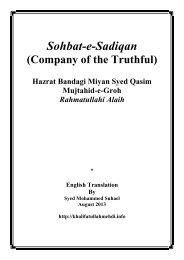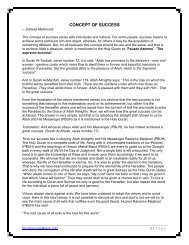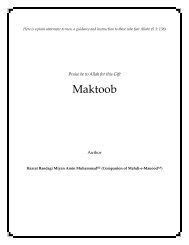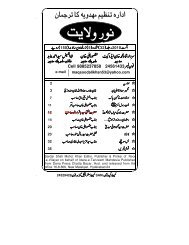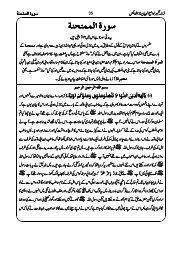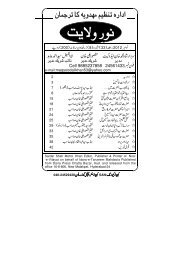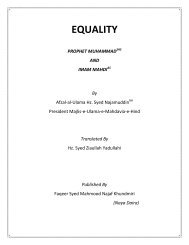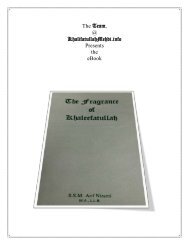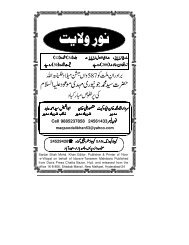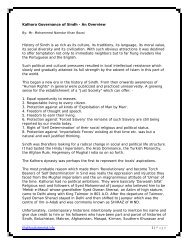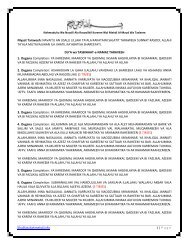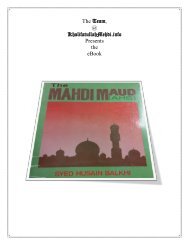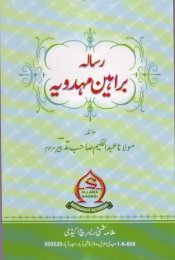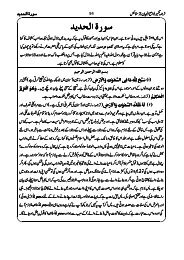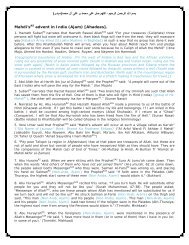Siraj-ul-Absar (English) - Khalifatullah Mehdi (AHS)
Siraj-ul-Absar (English) - Khalifatullah Mehdi (AHS)
Siraj-ul-Absar (English) - Khalifatullah Mehdi (AHS)
You also want an ePaper? Increase the reach of your titles
YUMPU automatically turns print PDFs into web optimized ePapers that Google loves.
50<br />
Regent of Allah, he is the khalifa of the Messenger of Allah SLM , his mission is to invite<br />
the people unto Allah and obedience to him is obligatory for every person. The<br />
mujtahid is not like this. Hence, his [the Mahdi AS ] being a matbu’ [one to whom others<br />
are subservient] is proved. When the Mahdi AS is proved on the basis of those<br />
arguments with which the Prophets AS are proved, then his sayings are in themselves<br />
evidence for us, irrespective of whether the sayings of scholars match his sayings or<br />
not, because that [the saying] in itself is hujjat [incontrovertible proof]. No argument<br />
is required to support the hujjat nor is it in need of any further proof. Hence, Abu<br />
Shukoor Salimi RH has discussed in his book, Tamheed:<br />
Because they [Prophets AS ] are the hujjat [incontrovertible proof] of Allah Most<br />
High for the people. And no further proof is produced to prove something<br />
that is already proven. Nor is it in need of any further proof. [Here ends the<br />
statement of Abu Shukoor Salami].<br />
Specification of Verses of Quran by Mahdi AS is not excluded<br />
from principles of Arabic<br />
Then, know O Just Man! That the Mahdi AS making the two Quranic Verses specific to<br />
himself and his community [It is on these that the critic (Sheikh Muttaqi) has raised<br />
his objection] is not excluded from the principles of Arabic grammar because the<br />
common is sometimes taken as special. It is stated in the book, Bazdooi, that:<br />
The Arabic word ‘man’ (who; the one who; those who; whoever) possesses the<br />
probability of both the common and the special [meaning]. And in the Sharahe-Mutavassit<br />
of Kafiah, which is known in our cities as Vafiah, it is written that<br />
‘man’ (who) and ‘ma’ (what) are used for sing<strong>ul</strong>ar, doublet [tasniyah], plural,<br />
and male and female genders. [Here ends the statement of Bazdooi].<br />
In summary, there is need for a system for takhsis [specificity], which proves the<br />
specificity like the command of Allah Most High: “’Afa-many-yakhluqu ka-mallaa<br />
yakhluq…” 47 , the purport of ‘many-yakhluqu’ (the one who creates) is Haq-Vahda-hoo<br />
[God Alone], because creation by anyone other than Him is impossible. Hence, in the<br />
command of Allah, ‘’ana wa man ittaba’anii’ (‘…I and the one who follows me…’ 48 ), the<br />
arrangement of the words indicate that the ‘man’ (the one who) is specific because it<br />
forms a conjunction with the personal pronoun which is present in ‘aduu’ [I invite].<br />
Then the meaning of this Verse is this: ‘I invite unto Allah on baseerat [vision] and the<br />
one who follows me will also invite people unto Allah on baseerat [vision].’ This ‘atf<br />
[conjunction] demands that the d’avat [invitation] of the tabe’ [follower] and the<br />
matboo’ [one who is followed] sho<strong>ul</strong>d be one and the same. Otherwise, there will be<br />
47 Quran, S. 16:17. The meaning of the quoted words is: ‘Shall He then who createth and he who cannot<br />
create anything be given the same regard?”<br />
48 Quran S. 12:108. The meaning of the complete verse is: Say: "This is my way: I invite unto Allah, upon<br />
vision — I and the one who follows me. Glory to Allah! And never will I join gods with Allah!"



